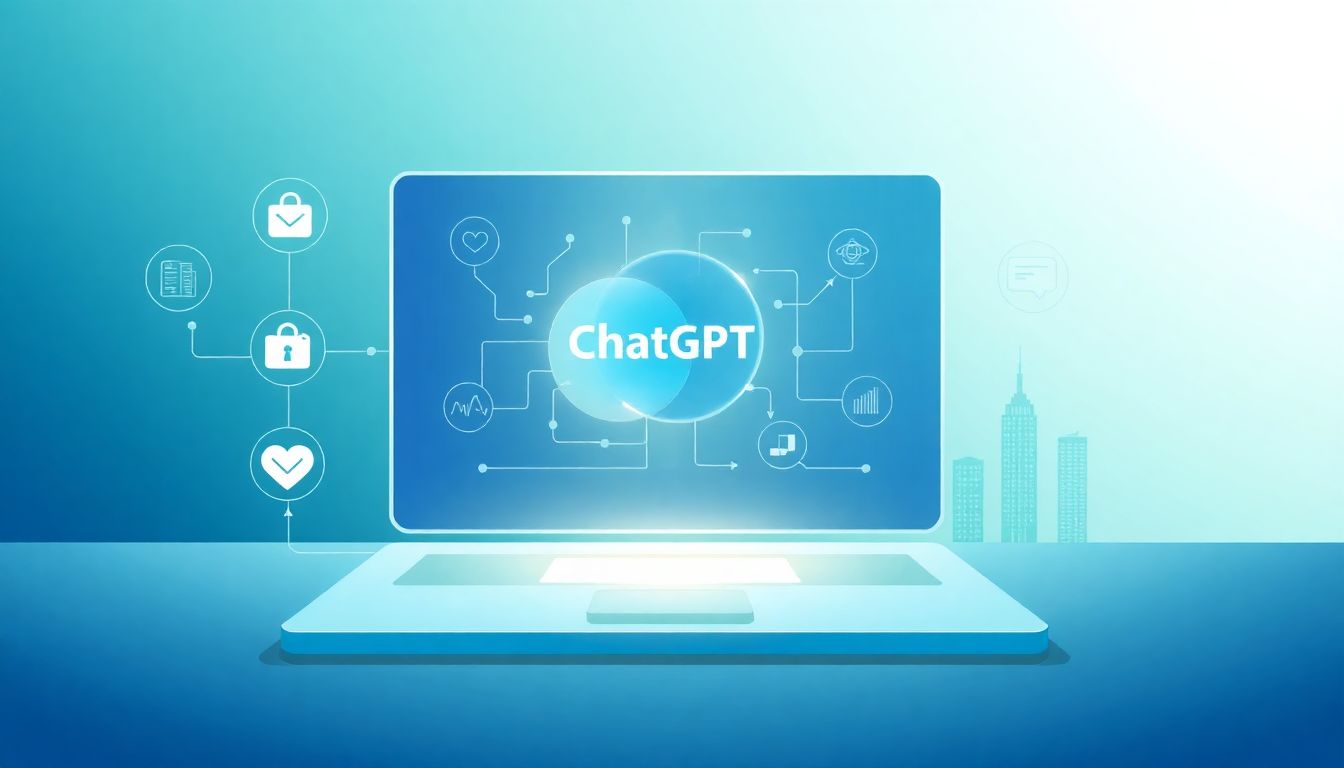It’s no secret that medical research can be a daunting field, filled with mountains of data and complex challenges. If you’ve ever felt overwhelmed by the vast amount of information or the slow pace of research progress, you’re definitely not alone. Many researchers share this struggle, and it’s a tough nut to crack.
But what if I told you that there’s a tool that could change the game? ChatGPT has the potential to streamline processes, enhance data analysis, and even aid in generating new ideas in medical research. Stick around, and you might just find the insights you’re looking for to help navigate your own research challenges.
In this discussion, we’ll explore how ChatGPT can revolutionize the medical field, diving into its opportunities, challenges, and even some real-life applications. Let’s unlock the potential of AI together!
Key Takeaways
- ChatGPT can streamline medical research by automating tasks like literature reviews and data analysis.
- This AI tool enhances efficiency, enabling faster progress in evidence-based medicine.
- Researchers face challenges such as data privacy, accuracy, and AI bias when using ChatGPT.
- Real-life applications include aiding clinical decision-making and supporting disease diagnosis.
- Best practices for using ChatGPT include clear, specific prompts and critical evaluation of outputs.
- Ethical considerations like informed consent and transparency are vital when implementing AI in research.
- The future holds promise for improved integrations with health records and personalized medicine applications.

How ChatGPT Can Revolutionize Medical Research
ChatGPT has the potential to significantly change the landscape of medical research.
By leveraging artificial intelligence and natural language processing, it can streamline various research activities.
From automating literature reviews to assisting with data analysis, ChatGPT enhances the efficiency of research methodologies.
This AI tool enables researchers to quickly sift through vast amounts of clinical data, improving the speed of evidence-based medicine.
Engaging with ChatGPT can result in better interpretations of complex data and transformed outcomes for healthcare.
Key Opportunities of Using ChatGPT in Medical Research
There are numerous opportunities that come with using ChatGPT in medical research.
First and foremost, it can enhance efficiency in data analysis, allowing researchers to focus on more critical aspects of their work.
For instance, ChatGPT can automate literature reviews, helping researchers stay updated without spending hours reading numerous papers.
Additionally, it can facilitate predictive analytics, offering insights into patient outcomes that can inform clinical decisions.
To get started with ChatGPT for medical research, try the following prompts:
- “Summarize recent advancements in cancer treatment from academic journals.”
- “Provide insights on predictive analytics in patient treatment outcomes.”
- “List potential research questions for a study on diabetes management.”
These prompts can guide ChatGPT to provide relevant information tailored to the needs of medical researchers.
Challenges in Implementing ChatGPT for Medical Research
Despite its benefits, several challenges come with implementing ChatGPT in medical research.
Data privacy is a major concern, as research often involves sensitive patient information.
Researchers must also contend with issues of accuracy and reliability, ensuring that the information generated is correct and trustworthy.
AI bias is another significant obstacle, as it can inadvertently influence research outcomes if not managed properly.
To tackle these challenges, consider using these prompts:
- “Identify common ethical concerns when using AI in medical research.”
- “Discuss strategies for ensuring data integrity in AI-driven studies.”
- “What regulations should researchers be aware of when implementing AI tools?”
Addressing these issues upfront can pave the way for successful integration of ChatGPT into your research processes.
Case Studies of ChatGPT in Medical Research Applications
Case studies provide valuable insights into practical applications of ChatGPT in medical research.
For example, ChatGPT has been used to support clinical decision-making by synthesizing relevant literature and providing evidence-based recommendations.
Another application includes disease diagnosis assistance, where ChatGPT helps identify potential conditions based on patient data.
These real-world examples showcase the tangible impact of AI on research outcomes.
If you’re interested in exploring how ChatGPT can be applied, consider these prompts:
- “List successful case studies of ChatGPT in diagnosing diseases.”
- “Analyze the effectiveness of ChatGPT in clinical trials over the last year.”
- “Summarize lessons learned from AI implementations in health policy research.”
By tapping into these insights, researchers can better understand the successful integration of AI into their work.

Best Practices for Using ChatGPT Effectively in Research
To maximize the benefits of ChatGPT in medical research, it’s essential to adopt best practices.
Start by providing clear and specific prompts. The more detailed your request, the better the response you’ll receive.
For example, instead of asking “What are the side effects of drugs?”, try “List the common side effects of Metformin in diabetic patients and provide reference studies.”
Next, ensure you’re evaluating the AI’s outputs critically. Always cross-check the information against reliable sources.
Consider collaborating with colleagues to leverage diverse perspectives and expertise when interpreting responses.
Incorporating standard operating procedures (SOPs) for prompt creation can also streamline your interactions with ChatGPT.
Use these example prompts to get started:
- “Draft a research proposal outline focusing on the impact of telemedicine on chronic disease management.”
- “Analyze the ethical considerations of AI applications in patient care, citing relevant studies.”
- “Create a checklist of quality controls for using AI in clinical trials.”
By implementing these practices, you’ll ensure that using ChatGPT enhances your research rather than hinders it.
Ethical Considerations When Using AI in Medical Research
Ethics is paramount in the application of AI technologies like ChatGPT in medical research.
Key considerations include data privacy, as sensitive patient data could be exposed if not managed properly.
Researchers must also obtain informed consent from patients prior to using AI tools in their studies.
Ensuring transparency about how AI influences decision-making processes can foster trust among stakeholders.
Moreover, addressing potential biases in AI outputs is crucial to maintain the integrity of research findings.
Utilize these prompts to explore ethical issues further:
- “Identify key ethical guidelines for implementing AI tools in clinical research.”
- “Discuss the implications of bias in AI outputs on patient treatment decisions.”
- “Outline steps to secure patient data when using AI for research purposes.”
Adhering to these ethical considerations can help mitigate risks and promote responsible AI use in research.
Future Directions for ChatGPT in the Medical Field
The future of ChatGPT in medical research shows tremendous promise.
As AI technology advances, we can expect improved accuracy and efficiency in data analysis and interpretation.
Emerging applications may include deeper integrations with electronic health records for real-time clinical insights.
Personalized medicine could also benefit from AI’s ability to analyze vast datasets and tailor treatment recommendations.
Anticipating advancements in natural language processing will ensure that ChatGPT can engage in even more complex research tasks.
Keep an eye on these forward-looking prompts as the field evolves:
- “Predict future trends in AI integration in medical research methodologies.”
- “Evaluate potential advancements in ChatGPT capabilities for drug discovery processes.”
- “Discuss the role of AI in shaping patient engagement and education in the coming years.”
By staying informed about future directions, researchers can leverage ChatGPT for groundbreaking innovations in healthcare.

Best Practices for Using ChatGPT Effectively in Research
To get the most out of ChatGPT in medical research, some practical best practices can guide your interactions.
Firstly, ensure your prompts are as specific as possible.
Instead of asking general questions, detail exactly what you’re looking for to enhance the quality of responses.
For example, rather than saying, “Tell me about diabetes,” try, “Summarize recent studies on the effectiveness of continuous glucose monitoring for type 1 diabetes patients.”
This level of specificity can provide targeted insights relevant to your research needs.
Secondly, regularly review and cross-reference the information produced by ChatGPT.
Challenge the findings by validating them with peer-reviewed literature or clinical guidelines.
This process will help ensure the accuracy and integrity of the data you’re using.
Utilizing collaborative efforts can also significantly improve your experience.
Engage with peers in brainstorming sessions to refine queries and enhance innovative thinking.
Incorporate standardized templates for your prompts to create consistency in responses.
Here are some prompts to help you utilize ChatGPT effectively:
- “Draft a systematic review outline on advancements in gene therapy for rare diseases.”
- “Generate a SWOT analysis of using AI in cancer research.”
- “Create a database schema for organizing research findings on autoimmune disorders.”
By following these best practices, you’ll set yourself up for a smoother and more productive interaction with ChatGPT.
Ethical Considerations When Using AI in Medical Research
When integrating ChatGPT into medical research, ethical considerations cannot be overlooked.
One major focus is data privacy, especially when handling sensitive patient information.
Researchers must ensure that data is anonymized and securely stored to prevent unauthorized access.
Informed consent is another critical aspect; patients should be fully aware of how their data may be used in research augmented by AI tools.
Transparency in how AI algorithms reach conclusions is vital for fostering trust among patients and stakeholders.
Moreover, it’s essential to actively work on identifying and reducing biases that could skew research outcomes.
Practicing ethical AI usage can be guided by the following prompts:
- “Discuss the importance of informed consent when using AI in clinical trials.”
- “Outline the ethical measures to take when analyzing patient data with AI tools.”
- “Evaluate how to ensure transparency in AI algorithms used for health research.”
By addressing these ethical considerations, researchers can build a responsible framework for using AI in their work.
Future Directions for ChatGPT in the Medical Field
The future of ChatGPT in the realm of medical research is predicted to be both exciting and transformative.
Advancements in AI technology are anticipated to enhance the precision of data analyses and interpretation.
As integration with electronic health records becomes more seamless, real-time insights will likely change clinical practices.
There’s potential for ChatGPT to support the growth of personalized medicine by efficiently sifting through massive datasets.
Moreover, ongoing enhancements in natural language processing may allow ChatGPT to tackle even more complex medical queries.
This can significantly influence areas such as telemedicine and patient engagement moving forward.
Consider these prompts to explore future applications:
- “Predict how ChatGPT could improve patient monitoring techniques in the next five years.”
- “Discuss the potential role of ChatGPT in enhancing clinical trial design and patient recruitment.”
- “Analyze how AI could reshape the landscape of public health research and policy.”
By keeping an eye on these future directions, you’ll be better equipped to harness ChatGPT’s power for groundbreaking advances in healthcare.
FAQs
ChatGPT can analyze vast amounts of data quickly, identify trends, and generate hypotheses, significantly speeding up the research process while allowing researchers to focus on higher-level analysis and decision-making.
Challenges include data privacy concerns, the need for rigorous validation of AI-generated conclusions, and potential biases in training data that could affect research outcomes.
Ethical considerations include ensuring patient confidentiality, maintaining transparency in AI decision-making, and addressing potential biases in AI algorithms to prevent inequities in research findings.
Best practices include integrating human oversight, validating AI-generated insights with clinical expertise, and continually updating the AI model with new research data to ensure accuracy and relevance.
